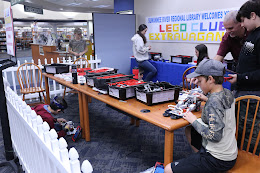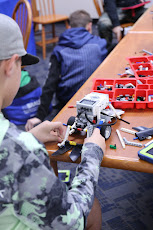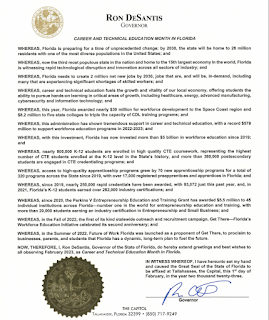On February 1, 2023, Governor Ron DeSantis and Education
Commissioner Manny Diaz Jr. designated February as Career and Technical
Education (CTE) Month.
CTE serves as the backbone of a strong, well-educated
workforce, offers lifelong learning opportunities, and contributes to Florida's
leadership in the national and international marketplace. With the help of
partners in education, business and industry, and trade associations, CTE
prepares both youth and adults for a wide range of careers in the 21st-century
economy, helping students experience the academic and technical skills required
to be successful in today’s economy. These careers may require varying levels
of education—from high school and postsecondary certificates to two- and
four-year college degrees.
In Florida, secondary schools in all 67 school districts, 28 Florida colleges,
and 48 technical colleges and centers offer high-quality CTE coursework,
certifications, skills-based education, degrees. Currently, there are 17 career
clusters throughout the state. The manufacturing
career cluster incorporates six career pathways to include:
1) Production,
2) Manufacturing Production Process Development,
3) Maintenance, Installation & Repair,
4) Quality Assurance,
5) Logistics & Inventory Control, and
6) Health, Safety & Environmental Assurance.
With Florida’s Perkins V-Strengthening Career and Technical Education for the
21st Century implementation plan, approved by the US. Department of Education
in June 2020, Florida students have now, more than ever, the opportunity to
participate in quality CTE programs.
FLATE with the support of the Florida Department of Educations and FloridaMakes
continues to strengthen quality CTE programs, providing resources for
educators, students, and industry. Educational resources are intended to
increase students’ awareness of and interest in careers in the field of
manufacturing. Resources are designed to engage students with fun, but real,
hands-on scenarios relevant to manufacturers in Florida, integrating the
academic and technical skills required in today’s high-technology
manufacturing.
For more information about educational resources visit FLATE.org, MadeinFlorida.org,
and FLDOE.org/CareerTechEdu.






